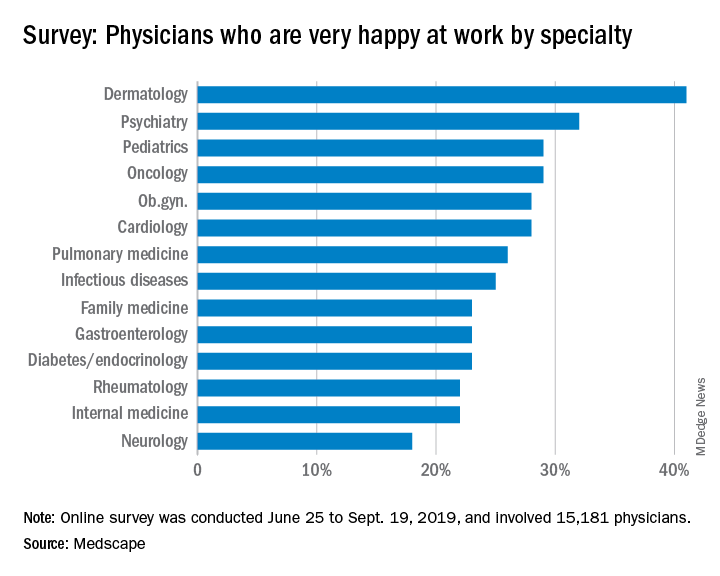User login
Rheumatologists may have a tough time in the office, but they know how to enjoy themselves once the workday ends, according to Medscape’s 2020 Lifestyle, Happiness, & Burnout Report.

In the Medscape survey, less than one-quarter of rheumatologists reported being happy at work, the same as internal medicine, with only neurologists reporting worse at-work happiness rates. While all measured specialties were happier outside of work than at work, no specialty had more of a gap than rheumatologists, rising from 22% at work to 60% outside of work.
The rate of burnout in rheumatologists was slightly higher than that seen in physicians overall (45% vs. 41%), with 78% of rheumatologists reporting that the growing number of bureaucratic tasks contributed most to burnout, followed by increased time devoted to EHRs (43%) and spending too much time at work (40%).
Rheumatologists most commonly dealt with burnout through exercise (46%), isolating themselves from others (45%), and talking with family/friends (44%). Rheumatologists were about average when it came to taking vacation, with 47% taking 3-4 weeks off of work, compared with 44% of all physicians; only 29% took less than 3 weeks’ vacation.
More than 90% of rheumatologists reported that they’d never contemplated suicide, with only 6% reported that they’d thought about it and none reporting that they’d attempted suicide. Similarly, 79% of rheumatologists reported that they are not and do not plan to seek professional help for symptoms of burnout and/or depression, with 10% saying they were currently seeing professional help and 8% saying they had been to therapy but were not anymore.
The Medscape survey was conducted from June 25 to Sept. 19, 2019, and involved 15,181 physicians.
It’s good that the issue of burnout is recognized and being discussed. It seems to me that our burnout is largely caused by externalities (such as patient complexity and administrative burdens).
On top of all that, there are administrative burdens. EHRs are a net-positive, but that doesn’t make charting any less painful. Add to that the daily insurance battles for life-saving treatments, which take up hours that are not compensated. And we still have to worry about patient satisfaction because we have to worry about our reputation.
So while encouraging “self-care” has some benefits, it does not address the bigger, more systemic issues. Of course the field of rheumatology is challenging – that cannot be helped. But effort should be made to alleviate the administrative burdens. Let us know that we are valued by listening to our grievances and addressing them. Don’t be dismissive.
Here are some examples that I think might help:
- Hospitals, physician practices, and health insurers could be audited for efficiency.
- Letting providers spend more time with patients (which I have to say my institution is really good about.)
- Provide better support staff. Really talented people managing patient phone calls and insurance prior authorizations will take a huge burden off of physicians’ shoulders.
- Explore the benefits of scribes. I know some doctors at our institution are lobbying them; I know using them is costly, but if it keeps the doctors happy and productive, is that not worth it?
Karmela K. Chan, MD , is a rheumatologist at the Hospital for Special Surgery and an assistant professor of medicine at Weill Cornell Medical College in New York.
It’s good that the issue of burnout is recognized and being discussed. It seems to me that our burnout is largely caused by externalities (such as patient complexity and administrative burdens).
On top of all that, there are administrative burdens. EHRs are a net-positive, but that doesn’t make charting any less painful. Add to that the daily insurance battles for life-saving treatments, which take up hours that are not compensated. And we still have to worry about patient satisfaction because we have to worry about our reputation.
So while encouraging “self-care” has some benefits, it does not address the bigger, more systemic issues. Of course the field of rheumatology is challenging – that cannot be helped. But effort should be made to alleviate the administrative burdens. Let us know that we are valued by listening to our grievances and addressing them. Don’t be dismissive.
Here are some examples that I think might help:
- Hospitals, physician practices, and health insurers could be audited for efficiency.
- Letting providers spend more time with patients (which I have to say my institution is really good about.)
- Provide better support staff. Really talented people managing patient phone calls and insurance prior authorizations will take a huge burden off of physicians’ shoulders.
- Explore the benefits of scribes. I know some doctors at our institution are lobbying them; I know using them is costly, but if it keeps the doctors happy and productive, is that not worth it?
Karmela K. Chan, MD , is a rheumatologist at the Hospital for Special Surgery and an assistant professor of medicine at Weill Cornell Medical College in New York.
It’s good that the issue of burnout is recognized and being discussed. It seems to me that our burnout is largely caused by externalities (such as patient complexity and administrative burdens).
On top of all that, there are administrative burdens. EHRs are a net-positive, but that doesn’t make charting any less painful. Add to that the daily insurance battles for life-saving treatments, which take up hours that are not compensated. And we still have to worry about patient satisfaction because we have to worry about our reputation.
So while encouraging “self-care” has some benefits, it does not address the bigger, more systemic issues. Of course the field of rheumatology is challenging – that cannot be helped. But effort should be made to alleviate the administrative burdens. Let us know that we are valued by listening to our grievances and addressing them. Don’t be dismissive.
Here are some examples that I think might help:
- Hospitals, physician practices, and health insurers could be audited for efficiency.
- Letting providers spend more time with patients (which I have to say my institution is really good about.)
- Provide better support staff. Really talented people managing patient phone calls and insurance prior authorizations will take a huge burden off of physicians’ shoulders.
- Explore the benefits of scribes. I know some doctors at our institution are lobbying them; I know using them is costly, but if it keeps the doctors happy and productive, is that not worth it?
Karmela K. Chan, MD , is a rheumatologist at the Hospital for Special Surgery and an assistant professor of medicine at Weill Cornell Medical College in New York.
Rheumatologists may have a tough time in the office, but they know how to enjoy themselves once the workday ends, according to Medscape’s 2020 Lifestyle, Happiness, & Burnout Report.

In the Medscape survey, less than one-quarter of rheumatologists reported being happy at work, the same as internal medicine, with only neurologists reporting worse at-work happiness rates. While all measured specialties were happier outside of work than at work, no specialty had more of a gap than rheumatologists, rising from 22% at work to 60% outside of work.
The rate of burnout in rheumatologists was slightly higher than that seen in physicians overall (45% vs. 41%), with 78% of rheumatologists reporting that the growing number of bureaucratic tasks contributed most to burnout, followed by increased time devoted to EHRs (43%) and spending too much time at work (40%).
Rheumatologists most commonly dealt with burnout through exercise (46%), isolating themselves from others (45%), and talking with family/friends (44%). Rheumatologists were about average when it came to taking vacation, with 47% taking 3-4 weeks off of work, compared with 44% of all physicians; only 29% took less than 3 weeks’ vacation.
More than 90% of rheumatologists reported that they’d never contemplated suicide, with only 6% reported that they’d thought about it and none reporting that they’d attempted suicide. Similarly, 79% of rheumatologists reported that they are not and do not plan to seek professional help for symptoms of burnout and/or depression, with 10% saying they were currently seeing professional help and 8% saying they had been to therapy but were not anymore.
The Medscape survey was conducted from June 25 to Sept. 19, 2019, and involved 15,181 physicians.
Rheumatologists may have a tough time in the office, but they know how to enjoy themselves once the workday ends, according to Medscape’s 2020 Lifestyle, Happiness, & Burnout Report.

In the Medscape survey, less than one-quarter of rheumatologists reported being happy at work, the same as internal medicine, with only neurologists reporting worse at-work happiness rates. While all measured specialties were happier outside of work than at work, no specialty had more of a gap than rheumatologists, rising from 22% at work to 60% outside of work.
The rate of burnout in rheumatologists was slightly higher than that seen in physicians overall (45% vs. 41%), with 78% of rheumatologists reporting that the growing number of bureaucratic tasks contributed most to burnout, followed by increased time devoted to EHRs (43%) and spending too much time at work (40%).
Rheumatologists most commonly dealt with burnout through exercise (46%), isolating themselves from others (45%), and talking with family/friends (44%). Rheumatologists were about average when it came to taking vacation, with 47% taking 3-4 weeks off of work, compared with 44% of all physicians; only 29% took less than 3 weeks’ vacation.
More than 90% of rheumatologists reported that they’d never contemplated suicide, with only 6% reported that they’d thought about it and none reporting that they’d attempted suicide. Similarly, 79% of rheumatologists reported that they are not and do not plan to seek professional help for symptoms of burnout and/or depression, with 10% saying they were currently seeing professional help and 8% saying they had been to therapy but were not anymore.
The Medscape survey was conducted from June 25 to Sept. 19, 2019, and involved 15,181 physicians.
